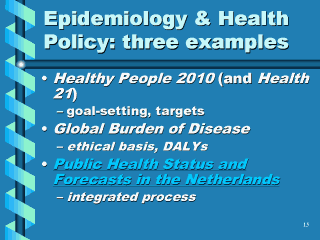 |
Healthy People 2010, the health
goals project of the United States. This is now in its third cycle, and appears to have
influenced public health policy in the US for the better. It is heavily epidemiologically
based–too exclusively so in its first version, but later versions have become broader
and better. The World Health Organization European Offices’s Health 21 is
similar, but less epidemiologic in orientation.Public
Health Status and Forecasts in the Netherlands. This excellent biannual report,
replete with epidemiologic analyses and projections, is part of a defined policy cycle,
and hence may be less vulnerable to being ignored than many other excellent reports. It is
practically a textbook of the epidemiologic methods relevant to health policy, and I think
that other countries would do well to emulate it. Incidentally, in my opinion, the
Netherlands does the best work in policy-oriented epidemiology, particularly the
Department of Public Health at Erasmus University in Rotterdam.
Global Burden of Disease project is an outstanding example of measuring health using
advanced epidemiologic methods, together with the application of ethical principles. Its
findings and especially its methods (e.g., the DALY) should influence policy in many
countries, although (being international) it is not directly related to policy mechanisms.
A similar orientation is evident in the recent World Health Reports, although these
obviously need more work. |
